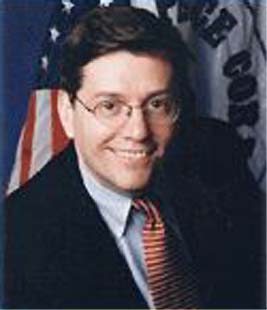
Mark Gearan performed at Mary McGory's funeral, playing pieces Mary chose
Honored To Have Known Mary McGrory
By Marc Fisher
Tuesday, April 27, 2004; Page B01
In 1981, in the last days of the Carter administration, the bureaucracy coughed up a $1 million grant to the Salvation Army. A couple of weeks later, the new Reagan government rescinded the gift.
But the Salvation Army had already allotted the money to poor families to pay fuel bills. The organization, a savvy political player, sent a uniformed symbol of charity, one Ernest Miller, to argue its case on TV.
At home in Cleveland Park that night, Mary McGrory saw and liked Miller. She rang him up the next day, and before he knew it, he was a regular at parties in Apartment 109.
Yesterday, Col. Ernest Miller sang "He Sought Me" at the Shrine of the Most Blessed Sacrament in Chevy Chase. The occasion was the funeral for Mary, whose column appeared in this newspaper and, before that, in the Washington Star, going back to 1954.
Miller had never sung that piece by himself before; at Mary's place, Miller always sang it as a duet with his wife. But four years ago, Miller received a letter: Mary desired that he perform the song at her funeral, as a soloist.
Mark Gearan, president of Hobart and William Smith Colleges in Upstate New York, performed yesterday, too, playing pieces Mary chose.
Gearan, the former head of the Peace Corps and a longtime piano player at Mary's parties, received the call a few years ago. "What'd you do this weekend?" he asked.
"It was rainy and no one was around, so I wrote my will," Mary replied. "Ernie's singing, you're playing."
Never mind that Gearan had not played the organ since high school. When Mary asked something of her friends, they stepped to it.
They did not do this to curry favor. They -- like the legions of fancy-pants reporters who wouldn't carry their own mothers' bags but gamely served as Mary's porters on the campaign trail -- did as Mary told them to because they loved and respected her utterly.
I grew up reading Mary's columns in the New York Post. I'd never been to Washington, but I knew it was a city full of rascals and rogues, people worthy of sneers and hugs and sometimes both. I got these notions from reading Mary.
She wrote with absolute authority, tempered by wit and charm.
Washington was her world. She lived up the block from the Indian Embassy, and therefore saw it as her personal supply of friends and food from the subcontinent. Daughter of a postal clerk, she held the Friendship post office to strict performance standards. When it failed, she marched over and confronted her carrier, sharing the results with her readers.
Mary loved this city, even when she blamed Marion Barry for turning it into a "long-running disaster of potholes, uncollected garbage, unplowed streets and notoriously surly bureaucrats."
Every year, Mary hailed the return of spring. "People who say Washington can't do anything right just haven't seen us do spring," she wrote in 1994. "Nowhere is it done better. Washington does spring without its usual maddening blather and lost motion: no delay, compromise, task force, czar, cost benefit analysis, no nattering about 'ongoing' and 'out years.' "
She loved nature and poetry and Italy and song. But let's get real:
When I became a Metro columnist, Mary summoned me to her office with this note: "I have three words for you."
I bolted across the newsroom. Mary drew herself up and delivered the edict: "Cruelty is important."
To do this job right, you must speak truth to power; you must name and blame the bad guys; you must get out of the office, as she did far more than reporters one-quarter her age.
Mary knew when to wield the stiletto, and she knew how to show her passion and her persistence. She never tired of slamming the District for its failure to care for its children. She ordered me to hit the mayor and hit him again until finally, her beloved stone lions were returned to their thrones on the Taft Bridge over Connecticut Avenue.
A few months ago, after a stroke stopped Mary's flow of columns, my friend Marjorie Williams told me that she, too, had been summoned to see Mary upon the announcement that Marjorie would write an op-ed column for The Post.
Marjorie also received three words: "Subtlety is overrated."
Marjorie and I were so happy to discover each other's message from Mary that for a few minutes, we forgot to be cruel and blunt.
Instead, we reveled in the truth that we each now had six words from Mary, ours to keep.
